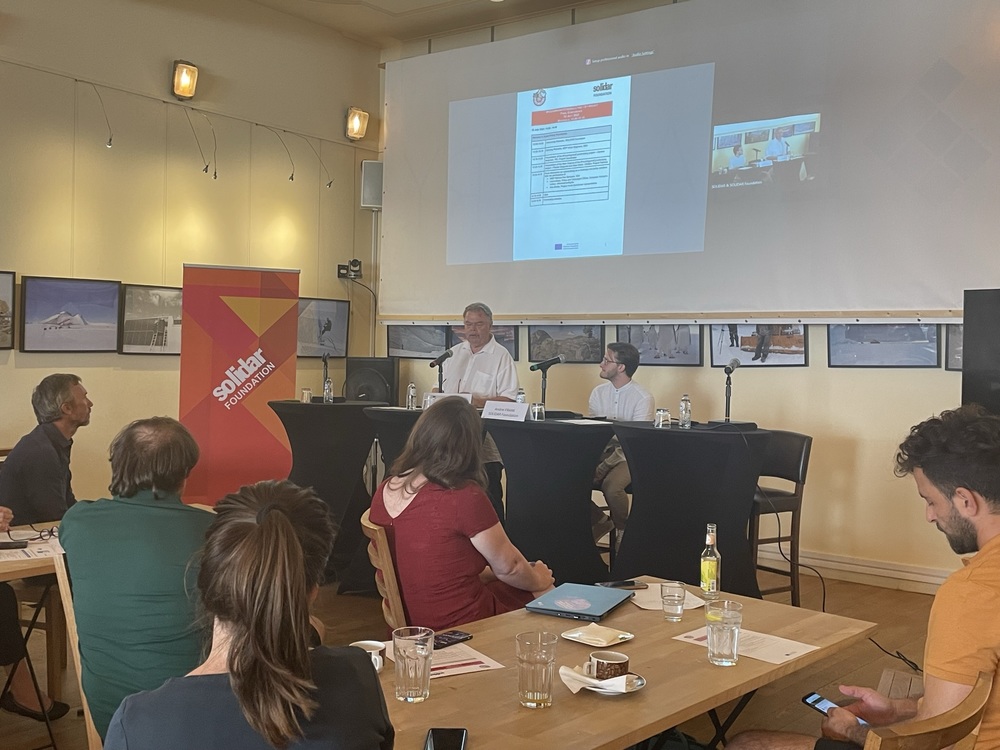A Bottom-up Approach for a Safer Online Environment: The Results of #YouthAgainstCyberBullying

On July 12, SOLIDAR Foundation hosted in a hybrid format in Brussels the final conference of the Erasmus+ co-funded project #YouthAgainstCyberbullying. The project involved Solidar Foundation, ARCI Liguria (Italy), CEMEA (France), FIC (Denmark), IDC (Serbia), Progressive (Hungary) and Solidarna (Croatia) for the development of concrete tools to combat cyberbullying, disseminated through multiplier events engaging hundreds of young people.
Consisting of two sessions, the conference touched first upon the main outputs of the project followed by a panel discussion on cyberbullying and then moved on to discussing examples of EU projects synergies across other projects related to digital education and safe digital environments.
The conference was opened by MEP Victor Negrescu, vice chair of the CULT Committee in the EP from the S&D Group, who reminded participants of the European Parliament report on Shaping Digital Education Policy. Providing participants with further examples of EU action to tackle cyberbullying, he also recalls the European Commission’s campaign Better Internet for Kids. He stresses that these actions need to be translated into implemented measures and that now, more than ever, partnerships are required among all stakeholders (the private sector, civil society, parents) as well as those affected by cyberbullying to support legislators in building up regulations at the local, national and European level. He concluded that civil society can contribute by analyzing the situation, identifying the means needed and working together with the EU on a European-wide monitoring mechanism for cyberbullying.
Direct engagement of the youth lies at the heart of this project, as this is the group of people who experienced cyberbullying first, remarked Carsten Andersen, Project Coordinator at FIC (Denmark). He added that the project is far from over as multiplier events are still taking place this summer to further the dissemination of the project and, although the project is technically ending this year, its results indicated that continuing its dissemination is essential, as they proved to be relevant for the target group.
The two main outputs of the project, the online platform and the mobile application were presented by respectively Fabien Degoulet and Alice Chisin who represented CÉMEA (France). The two tools aim to clarify the definition of cyberbullying and provide useful resources such as good practices, educational tools, links and contacts to know how and where to seek help for young people experiencing cyberbullying. All these resources are available in the language of the countries involved in the consortium.
Sharing his enthusiasm for the event during the panel discussion, MEP Marcos Ros Sempere from the S&D Group, called attention to the fact that cyberbullying is growing exponentially and, therefore, it requires firm action also by policymakers. He remarks that the EU still lacks a strategy on cyberbullying. He also noted that even though currently the EU has limited powers in the field of education, more attention should be given to media literacy, also in the frame of the Digital Education Action Plan.
MEP Ros Sempere was followed by Laura Kaun, Policy and Campaigns Officer at the European Women’s Lobby, who elaborated on online violence against women and girls while presenting the campaign #HerNetHerRights. The campaign intends to, among other things, underline the need to implement the Istanbul Convention, which is aimed at combating domestic violence and violence against women. The panel discussion was concluded by #YouthAgainstCyberBullying Youth Frontrunner Ana Marce, who stated that one of the most important outcomes for her was to understand how to identify bullying in the first place.
At the second session of the conference which was dedicated to EU-funded projects synergies, Carla Scaramella representing SOLIDAR’s member ARCI (Italy) presented the project REACT, which is built upon the previous experience of the PRISM project. She stated that rather than seeking continuous innovation per se, EU funding should encourage the continuation of good practices and their further development. Zuzana Schreiberova, from MKC who presented practices and lessons learned from 3 other EU funded projects. Laura Chamas from La Ligue de l’Enseignement presented the E-media – Media Literacy and digital citizenship for all project.
Carsten added that the idea of peer evaluation and feedback among coordinators of EU projects should be ingrained far more strongly into EU projects. At the same time, there is a need for more avenues to ensure that outcomes of past projects can be taken on board in new projects and mainstreamed rather than forgotten at the expense of the demands for constant innovation. On this note, all participants were invited to continue collaborating and exchanging, taking the opportunity with their projects to raise awareness of the work done by their peers in other contexts.
Though it was the project’s final conference, actually the project just started!
The website and the mobile app of #YouthAgainstCyberBullying are out there for further use which means it is now that the project can have a further impact.


